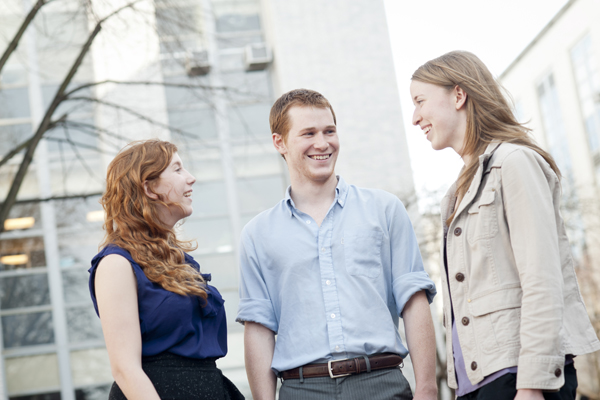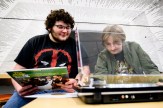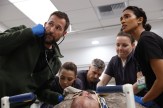Three Northeastern students named Fulbright scholars

Three Northeastern students—Lucas Schoeppner, Lauren Byrnes, and Hollis Thomann—have received Fulbright Scholarships for 2013–2014. The trio will leave in September to complete their Fulbright U.S. Student Program awards, all of which will take place in Germany.
The three Fulbright scholarships are the most awarded at Northeastern in one year, said Jonna Iacono, director of the Office of Fellowships.
The Fulbright Scholarship is a merit-based award that provides funds for U.S. citizens to study, conduct research, or teach internationally. As recipients of one of the most prestigious nationally competitive fellowships, Fulbright scholars seek to increase mutual understanding between the people of the United States and other countries across a vast array of disciplines.
Schoeppner, a 2012 graduate who earned a degree in journalism with double minors in history and international affairs, is one of five students nationally selected to participate in the Fulbright U.S. Young Journalist Program. Through his 10-month scholarship, the Pennsylvania native will conduct research and work with one or more media institutions. He plans to continue investigating a topic that recently piqued his interest: the economic and environmental consequences of fracking—also known as hydraulic fracturing, a process of extracting natural gas and oil from shale rock layers deep underground.
Schoeppner said fracking presents a unique intersection of environmental, economic, and policy issues. “The use of fracking technology has exploded over the past several years in the U.S., creating a huge environmental debate, revolutionizing the fossil fuel industry, and forcing alternative energy programs to cope with new realities,” he explained. “I want to look at the practice objectively and investigate the impacts fracking will have if, and when, it’s adopted in Germany.”
While working on co-op at Boston-based Ceres, a network of environmentally conscious investors, in 2011 he began to understand the environmental and economic factors that shape large-scale multinational corporations’ decisions to tap into natural gas reserves.
“For better or worse, some communities don’t want fracking in their area,” Schoeppner said. “While in Germany, I want to be part of the ongoing national discussion on if, and how, to develop the 8 trillion cubic feet of natural gas under German soil.”
Byrnes, a senior biology major, has received a Fulbright for Study and Research and will pursue her master’s degree in molecular biosciences at Heidelberg University in Germany. The Ohio native plans to expand on her impressive in-class and experiential research into cellular and molecular biology, particularly as it relates to cell migration.
“My experiences in the lab have been instrumental to my understanding of techniques and theories taught in the classroom,” Byrnes explained. “Learning about DNA and proteins and working with them is very different. My opportunities to design my own experiments and gain independence in a lab setting are a major reason why I want to and why I’m able to attend graduate school.”
Her interest in international collaborations was sparked by a study abroad experience in Frieburg, Germany in Fall 2011. During this experiential-learning opportunity, Byrnes learned that the work of science revolves around strategic multinational partnerships, and it strengthened her desire to live, study, and research in Germany following graduation and pursue a career as a global scientist.
Thomann, a senior linguistics major with double minors in international affairs and psychology, earned a Fulbright English Teaching Assistantship in Germany. As part of her 10-month program, Thomann will assist English instructors and teach English as a second language. She also hopes to learn more about the successful bilingual English-German programs in the German school system and translate those best practices back home in U.S. bilingual education programs.
“Bilingual education laws vary by state in the United States,” Thomann explained. “All educators have their general teaching certificate, but most are not specialized in bilingual education. That training then falls on the schools. It’s important to get these teachers trained in bilingual education techniques because it will benefit both the school and the student.”
Thomann hopes her work in Germany will build on her previous experiences teaching and researching bilingual education in America, and help her in advocating for bilingual programs.
“Through my understanding of linguistics, I’ve been able to be a more effective English language teacher,” Thomann said. “I want to empower other language teachers, particularly those in bilingual programs, to use linguistics to improve language learning.”





